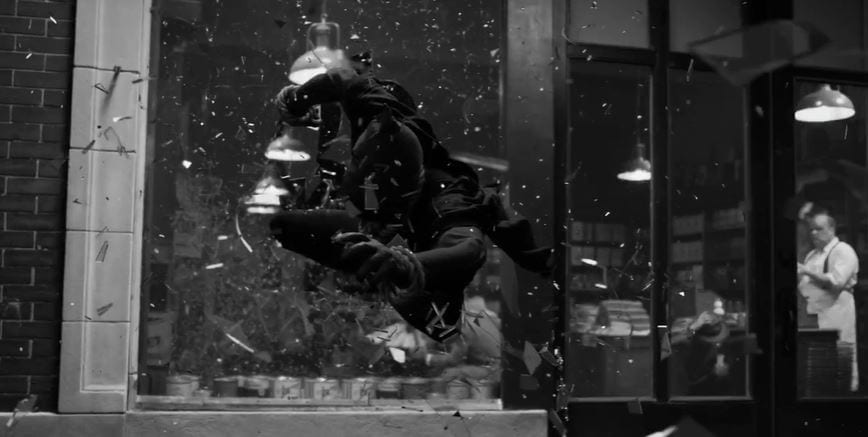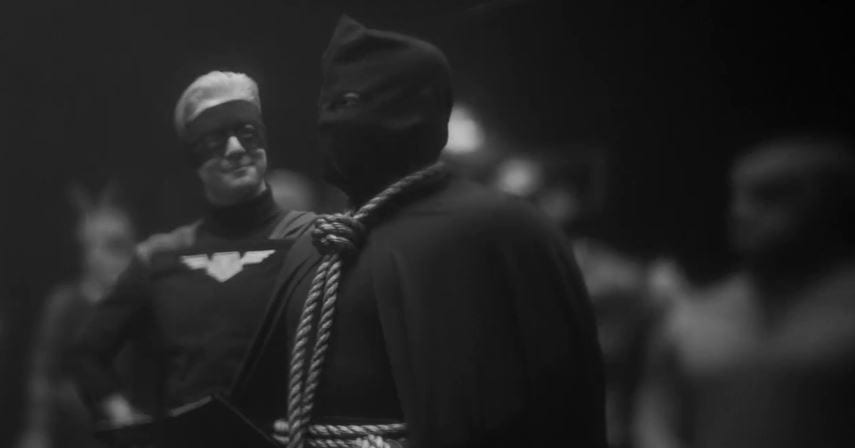Ever since the opening scene of this first season of Watchmen, fans have waited and wondered for the Tulsa Massacre, and Will Reeves’s survival, to factor into the modern-day. We’ve had small connections, for sure. The story mostly takes place in modern-day Tulsa. Angela is Will’s granddaughter. The legacy of racial violence continues through the Tulsa police force and the 7th Kavalry.
With this episode, Watchmen wove together a generation-spanning tale that tied together the past and present, tied together every plotline, and set up the plot moving forward. We may not know the specifics, but the pieces have been put in place throughout this remarkably well-made piece of television.
“This Extraordinary Being” functions mostly as an origin story, a connection hammered home quite early when Will comes across someone reading Superman’s very first appearance in Action Comics. People made the comparison between Will’s survival of the Tulsa Massacre and Kal-el fleeing Krypton back in the first episode, but this episode hammers the point home. This was the origin story for Hooded Justice. We see the first time Will dons a mask, the inspiration for his costume, and bits of his history with the Minutemen. We see just how this identity tore his life apart.

This was the most explicitly racially-charged episode of Watchmen since the first episode. Will’s backstory is one of intense discrimination and bigotry. He joins the NYPD, just to see different rules apply to white people skirt the law and have his fellow officers beat and almost lynch him. He joins the Minutemen, only to find out they don’t care about helping him stop a KKK plot that is killing black citizens. All throughout, reminders of the original race crime, the attack on Tulsa, play at the back of his mind.
As a result, the Will Reeves we see throughout this episode is a very angry man trying not to be angry. He never dealt with this anger over the injustices of his life. It simmered in the background, consuming him, and ultimately making him lose everything.
The entire episode is shot in black and white, further exemplifying the consuming role that race played throughout Will’s life. Shots of color splash throughout as memories of his mother or the Tulsa attack forcefully interrupt his attempts to move on. Since this is all coming about due to Angela swallowing the nostalgia pills in the previous episode, and these memories all come about through her mind experiencing Will’s memories, we also get these fascinating splits in perspective between Will himself and Angela in Will’s place. This works to blend the conflicts between past and present, and grandfather and granddaughter.
In the end, we see Will finally give in to his anger when he murders the cops who are part of the Mesmerism plot he uncovers. At this point he has lost his wife and son, he has no place in the NYPD, he has no place in the Minutemen, and all he has left is the anger.
The decision to make Hooded Justice a black man will likely cause outrage among the whiny racists who review-bomb this show simply for daring to paint white supremacists as bad people, but it really works to spectacular effect. A big part of the history of superhero comics has been the way they represent the oppressed minorities of society. Superman represents immigrants. The X-Men are the civil rights movement. To make Hooded Justice, the first superhero in the Watchmen world, a black man, speaks to this very nature. On top of this, he is also bisexual, and possibly gay.
The graphic novel did the same thing with making Silhouette a lesbian, and this episode continues that trend by making Captain Metropolis gay, as well. The original hero squad turned out to exactly what you expect based on comic history; a group of people from marginalized communities who found an outlet for the rage sparked by that marginalization. And then there’s the Comedian.
Yet even within this group of somewhat like-minded individuals, Will didn’t belong. He fought for the black community, and the others did not. When the time came to help him, they did not. He was exploited. In the end, his contributions were erased and he is remembered as a white man.
It is a fittingly cruel fate for the Watchmen universe, which has always portrayed superheroes as damaged outcasts to be pitied, not lionized. It’s also a fittingly cruel fate for the essential contribution of people of color to the world. How many times have women and/or POC had their work erased or attributed to white men?
We see with the mesmerism flashlight at the end that at some point between murdering the KKK members in that warehouse and Angela finding him beneath Judd’s hanged body, Will adopted the weapon he once fought to stop for his own use. There will probably be divided opinions about whether mind control is too silly for this story or not. Ultimately this will depend on where exactly it goes. Which begs the question of where exactly this is going.
It is a safe bet that this mesmerism tech is going to cause the main conflict to come this season. Will most certainly share this tech with Lady Trieu, who most certainly plans to use it. We know through the Petey-pedia stuff HBO is releasing that Lady Trieu is giving brand new televisions to everyone in the Tulsa area. It only follows that she will use these TVs to use the mesmerism tech towards some purpose.
I also expect this plot will occur during the final episode of American Hero Story. The false Minutemen show has been lingering in the background in every episode, and we know it’s an extremely popular one. I wouldn’t be surprised if this was Lindelof’s way to take a shot at superhero culture.

Considering the harsh traumas both Will and Trieu have undergone, it’s easy to assume that they may seek some kind of harsh violence. Most will probably expect some kind of Tulsa Massacre 2.0, this time aimed at the white residents. Will wanted Angela to take the nostalgia pills so that she would understand what he and Trieu are about to do. Some kind of brutal violence against the people who oppressed him would need an understanding Angela otherwise wouldn’t have.
I don’t expect anything of the sort, though. Nothing about Will or Trieu strikes me as particularly vengeful. This episode certainly shows us a time where Will was vengeful, but I don’t think he is now. And even if he is, Trieu would not be.
Most likely, they want to use this technology to try and end the social and racial divides. Considering Trieu’s experiments with her daughter, which seemed aimed at making sure a person can truly feel the past of someone else, they may use this mesmerism plot to make everyone watching on Trieu’s televisions feel intensely the crimes and traumas of the past, all aimed at creating a genuine, lasting sympathy and empathy among mankind. Trieu’s creation of nostalgia pills were probably her earliest attempt at such a plot, or at least some kind of test run.
Now, I doubt the plan works. This being Watchmen, I can’t imagine some insidious, manipulative plot involving mind control to actually work. It will most likely backfire in some horrific way. Here’s hoping things don’t end on too dark a note. After all, superheroes are meant to serve as a symbol of hope for a society lacking them. I know Alan Moore’s thoughts on superheroes. I hope Lindelof has something of a better, more hopeful view for his series.
Of course, nothing about this brings Adrian Veidt or Ozymandias into play. We have no idea how the 7th Kavalry would factor in, though they certainly do in some way. Watchmen can never answer every question too quickly. Lindelof certainly doesn’t.
I really hope, whatever the plan, that Lindelof’s “remix” of the Watchmen story tries to bring peace through something besides widespread death and destruction.
Whatever happens moving forward, Watchmen delivered one excellently made episode that will stand tall among the best episodes of anything this year. Whatever your opinions about the show, and I fully understand how mixed they are, this one is worth watching for anyone. “This Extraordinary Being” is the kind of episode with so much to dissect and analyze that you can watch it five times and always find more to it.
Now excuse me, I’m off to watch once again.

